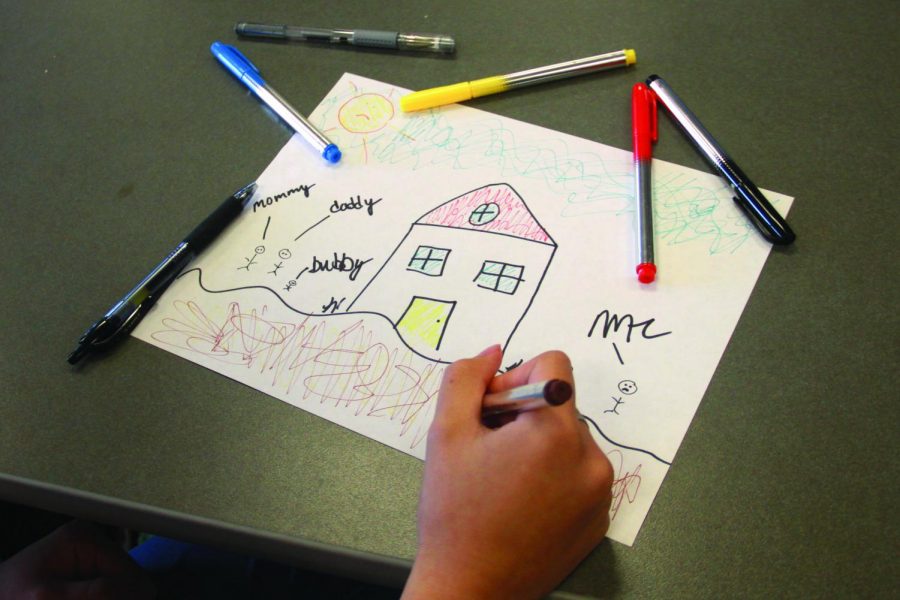“Home” Away From Home
The Flaws of the Foster Care System
May 9, 2019
He was silent. There was no smile, no laughter, no joy that a child as young as four should feel. Seeing him for the first time in a year, it was heartbreaking to see my step-brother return home in such a state. Although, I suppose I could not expect much, because he had only just returned to the family that had been dismantled in his absence.
It was August of 2014 when my father and step-mother were arrested on charges of “Battery in the third degree” and “Endangering the welfare of a minor.” A small argument had developed into a violent fight between the two, and it not only sent them behind bars, but it also forced my brother into the foster care system.
In the U.S. each year, there are around 600,000 children who experience the foster care system, taken from homes where they previously faced neglect, abuse and other traumatic experiences. Foster care provides them a safe haven where they may be cared for, although not always by their biological relatives, but in a supposedly home-like environment. The question remains, however, whether damage to the child is being prevented and if the homes provided are genuine and loving.
My brother went from a group home to a foster family and back to a group home in the span of a year. Yes, they gave him food, clothes and necessities for his day-to-day living there, but he never grew attached to anyone. He went to one place and then another to go through the same process, repeating like a broken record. Both in a facility with other kids in his situation and in a foster family, he remained alone. If any relationships were established, they were disrupted in the move to his next placement. There were no connections made. There was no love or compassion provided to him. In his eyes, he had been hurt and neglected by us, his family, and disposed of in a system that acted as a terrible substitute for the parental care he needed.
To take in foster children, families must commit to set up background checks, home studies, many hours of training and further examinations. Policies are put in place to ensure security and care for the child, but that is only if the child even makes it into a foster family. While the number of foster families able to take in the children is already limited, over half of new foster parents drop out within their first year. No child is guaranteed to be placed in a home that provides them the true family they deserve. Some children may be placed in group homes, where they can feel neglected among the other children, only provided with their basic needs and nothing more. Although group homes have evolved and improved with regulations over time, there is still a lack of compassion present in many of these facilities. Even in the best homes or foster families, however, it is rare for children to truly connect on a deeper emotional level, if they connect with anyone at all.
Government funding is provided to foster care organizations and families; however, this does little to fix the problems in the system involving the proper care of the children. There is no amount of money that can build relationships between children and their foster families or caretakers. Children should be cared for financially, but emotionally as well. Children in this situation have been taken from their families; the least that can be done is to give them a stable relationship with someone else–not as a replacement, but a new caregiver that treats them the way a biological parent should.
It has been years since my brother returned from foster care, but he is not the same. We are no longer close; he has built up a wall of resentment and shuts us out. He has behavioral problems and can lash out at any given moment, and he is not the only former foster child with this issue. A study in the early 2000’s comparing foster children to children that weren’t in foster care revealed that the foster children were 12 times more likely to have mental health problems. Years later, another study found that children in foster care were still significantly more likely to have mental health issues than those not in care, especially problems in socializing, thinking, aggression and further issues. These developed issues are not my brother’s or any other child’s fault, though; their resentment and problems stem from the emotional abandonment they face in the system.
Foster care is essential for the safety of the children who need it, but the system is flawed. There needs to be reform that creates environments that provide not only the basic needs of a child, but love and compassion as well. Home is not an address, but a state of mind that children must encounter no matter where they are. In order for the system to improve, it must find a way to allow children to feel more at at home, even if that that means more policies for foster families or social workers or anyone involved in the care of the children. Without a doubt, children need a sense of security, but this cannot be fully accomplished without an emotional appeal to them as well. Whether it be changes to the infrastructure or the people in charge, change is necessary in order to establish environments for children that provide them with love as much as security.



















